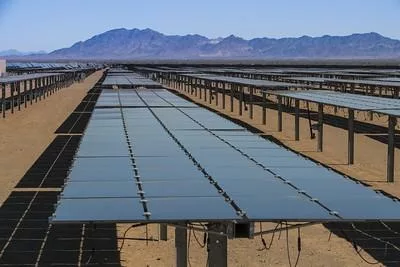The pursuit of a greener future has taken a giant leap forward, with the Biden-Harris administration announcing substantial strides in clean energy initiatives on public lands. These efforts are in line with President Biden’s ambitious objective of establishing a power sector free from carbon pollution by 2035.
Surpassing Clean Energy Milestones
Remarkable progress has been made under the stewardship of Interior Secretary Deb Haaland, with the department’s approval of over 25 gigawatts of renewable energy projects, eclipsing targets set for 2025 and signaling a bold step towards sustainability.
This monumental achievement translates into a capacity to supply electricity to over 12 million American homes through a mix of solar, wind, and geothermal sources, including essential gen-tie lines that integrate clean energy from various lands into the national grid.
Accelerating the Clean Energy Economy
The department’s dedication is clear from the rapid permitting of double the number of clean energy projects compared to the previous administration, amounting to nearly 29 gigawatts. These efforts, coupled with exciting developments like operational solar projects Arica and Victory Pass in California, signify a power boost to more than 5 million homes across the Western U.S.
Renewable Energy Rule Revamp
In tandem with big-picture achievements, the Bureau of Land Management (BLM) has finalized a Renewable Energy rule, aimed at decreasing costs for consumers and encouraging further development of solar and wind ventures on public terrain. The rule aligns with the administration’s goals to deliver quality jobs in the manufacturing sector and uphold American industry.
Acting Deputy Secretary Laura Daniel-Davis emphasizes that this rule represents a key milestone, allowing the Interior Department to spearhead renewable energy while crafting a resilient infrastructure that can stand up to climate change.
Job Creation and Economic Growth Through Renewable Projects
Renewable energy isn’t just about environmental responsibility; it also serves as a catalyst for job creation. Numerous utility-scale clean energy projects are on the horizon, with the potential to significantly increase employment opportunities and add over 32 gigawatts of power across the West.
Through these initiatives, the BLM is not only contributing to a cleaner planet but also supporting the blue-collar workforce and fostering economic growth. Furthermore, updated renewable energy regulations promise an 80% reduction in capacity fees for solar and wind projects, showcasing the department’s commitment to accelerating the clean energy transition.
As the department progresses, the implementation of project labor agreements and the preference for American-made materials are integral to the agenda. This approach exemplifies the administration’s resolution to forge a sustainable future that is also economically inclusive.
Operational Solar Projects Mark a New Era
The activation of the Arica and Victory Pass solar projects marks a significant chapter in America’s renewable energy narrative. These facilities are not only powerhouses of clean energy but also represent a considerable investment in infrastructure and employment.
With these advancements, the U.S. takes confident steps towards meeting its far-reaching climate goals. The BLM’s partnership with various stakeholders, including state and Tribal governments, illustrates the collaborative spirit needed to strike a balance between energy needs and environmental preservation.
As we witness the construction launch of other projects, like the Camino Solar project in Kern County, California, we’re reminded of the ongoing commitment to harness the power of renewables to fuel our homes and economy. Behind every megawatt generated lies the potential for more jobs, cleaner air, and a planet that’s better prepared for future generations.
